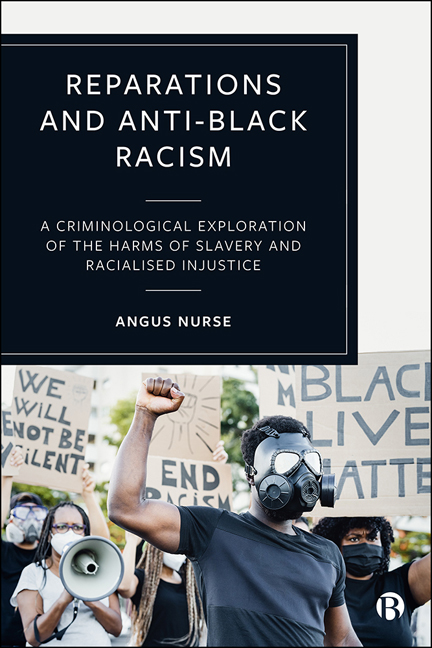 Reparations and Anti-Black Racism
Reparations and Anti-Black Racism Book contents
- Frontmatter
- Contents
- List of Abbreviations
- Acknowledgements
- Preface
- 1 Black Lives Matter: The Legacy of Slavery
- 2 Slavery and Reparations: A Criminological View
- 3 Reparations Litigation: An Overview
- 4 Victims of Slavery and Reparations: Who Suffers?
- 5 A Comparative Analysis of Reparations
- 6 Unjust Enrichment and the Socio-Legal Case for Reparations
- 7 The ‘Value’ of Reparations
- 8 The Nature of Reparations
- 9 Reparations in the 21st Century: Contemporary Debates and Issues on Reparations
- Appendix: Reparations Litigation and Settlements
- Notes
- References
- Index
6 - Unjust Enrichment and the Socio-Legal Case for Reparations
Published online by Cambridge University Press: 13 May 2022
- Frontmatter
- Contents
- List of Abbreviations
- Acknowledgements
- Preface
- 1 Black Lives Matter: The Legacy of Slavery
- 2 Slavery and Reparations: A Criminological View
- 3 Reparations Litigation: An Overview
- 4 Victims of Slavery and Reparations: Who Suffers?
- 5 A Comparative Analysis of Reparations
- 6 Unjust Enrichment and the Socio-Legal Case for Reparations
- 7 The ‘Value’ of Reparations
- 8 The Nature of Reparations
- 9 Reparations in the 21st Century: Contemporary Debates and Issues on Reparations
- Appendix: Reparations Litigation and Settlements
- Notes
- References
- Index
Summary
This chapter examines questions of who benefits or benefitted from slavery as well as further examining the nature of disadvantage and inequality. It examines the arguments raised in reparations litigation concerning the benefit gained by companies and other institutions (discussed in Chapter 3) but explores this within the context of specific arguments about enrichment, specifically the legal concept of unjust enrichment. Central to these arguments are questions concerning whether the present-day status of some institutions and even wider society is built on their participation in historic injustices and arguably whether they could be said to have benefitted from participation in discriminatory practices.
As outlined in this chapter and elsewhere in this book it has been argued that reparations should not be paid by present-day institutions for harm caused by their predecessors due to an activity that was ostensibly legal albeit distinctly harmful to a specific community or section of a society. This chapter challenges this notion in part by examining the unjust enrichment argument from a contemporary criminological and zemiological perspective, contending that ideas of the need to remedy contemporary injustice and social harm, arising from the legacy of slavery can be applied to the concept of unjust enrichment. Thus, it argues that the concept of unjust enrichment should be applied not just in the strict context of whether institutions can be said to have acted legally or illegally at the time of slavery, but adopting the Roman Law principle that no one should benefit at another's expense. In part, this chapter makes an argument for institutions to recognize that their existing wealth and social prestige amount to unjust enrichment, irrespective of any legal arguments that the doctrine should not apply.
In examining this issue this chapter argues for a wider articulation of unjust enrichment accepting that it is a civil rather than criminal doctrine and is concerned with addressing harm rather than directly engaging with issues of punishment. However, some of the slavery reparations cases to date arguably are concerned with issues of punishment rather than redress and might be considered to be backward-looking in respect of failing to address or prevent future harm.
- Type
- Chapter
- Information
- Reparations and Anti-Black RacismA Criminological Exploration of the Harms of Slavery and Racialised Injustice, pp. 73 - 84Publisher: Bristol University PressPrint publication year: 2021


